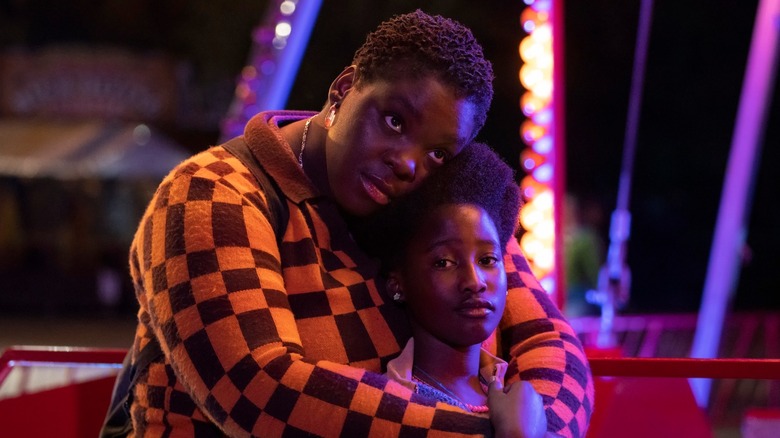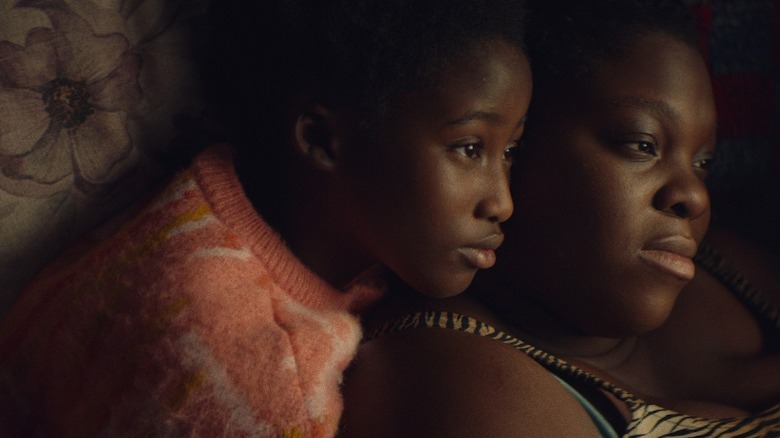Girl Review: A Sensitive, Striking Exploration Of Trauma [Sundance]
Images of hands, eyes, embraces, and bonding between mother and daughter. These opening shots express the intensity of the love between mother Grace (Déborah Lukumuena) and 11-year-old daughter Ama (Le'Shantey Bonsu), who live in a Glasgow high-rise. There's no doubt these two care deeply for each other and would do anything to keep each other happy. If only things were that simple.
"Girl" is a delicate and poignant film. In a striking moment, Ama's peaceful serenity is interrupted by opening the window as the sounds of the city pour in. Ama crawls out the window to observe neighbors in the opposite high-rise. There's a sense she's longing for what the other people have — Ama seems frustrated. Soon enough we realize why: Grace is extraordinarily protective of Ama, so much so that she's furious Ama started shouting about a fire in the other building. She's saved lives, but it means people have noticed Ama, which terrifies Grace. Grace reminds Ama of their rules; to keep to themselves, and that they cannot trust anyone. No matter what.
That's a lot to take for anyone, let alone a child, and it's clear Grace's overbearing and hyper-protective nature has serious repercussions when it comes to Amas' well being. She's frightened at the mere idea of going to school, and Grace only lets her go because a social worker is on their case, and Grace would, of course, rather let Ama out of her sight for a few hours than lose her for good. When she is at school, she makes herself invisible, hiding in the background, never speaking, and always observing.
Grace works nights cleaning at a nearby mall, which means her daytimes are free to sit outside of Ama's school all day waiting for her. Grace counts as she walks, as a way of keeping grounded and staving off panic attacks. She's a desperately lonely woman, and Ama is all she has in this world.
As Ama starts to desire a life of her own away from the confines of their apartment, Grace starts to panic. She tapes up the mailbox slot on their door and boards up the windows in an effort to keep people away and Ama close to her. The sweet, loving foundation evident from the opening shots is crumbling, Ama is yearning for independence, and Grace is struggling to keep her panic attacks and overwhelming fear that her daughter is in danger at bay.
A thoughtful and emotional approach to trauma
"Girl" explores the weight of trauma with care and respect. The specifics of Grace's trauma aren't revealed until later in the film, but there's plenty of evidence that allows viewers to piece things together. Grace does seem awfully young to have an 11-year-old daughter, and those suspicions are confirmed when she reveals to her boss that she was just 14 when she had Ama. It's a slight but devastating reveal that transforms the very meaning of the film's title: while Ama is a girl, Grace's girlhood was taken from her. It's also clear that the pair have emigrated from another country, and Glasgow is their new home, away from the family and friends they once had. It's an us against the world situation, but as Ama strives for a world outside her mother, Grace retreats further into herself.
First-time director Adura Onashile (who also wrote the screenplay) never casts judgment on her characters. Her camera is an observational one, and her script is sharp, never revealing too much, using film as a visual medium to tell us what we need to know. This is filmmaking at its most thoughtful and humane. Yes, how Grace treats Ama is clearly detrimental to both their well-being, but "Girl" understands the weight trauma bears, and even moving to a different country, or even continent, isn't enough to extinguish the agony that comes with it. A lesser film would paint Grace as a villain, but "Girl" sees her exactly as she is — a woman suffering from suffocating anguish. Everything Grace does is, in her mind, the best thing for her daughter. That may not be reflective of their reality, but it's clear that Grace is trying her best.
This is a heartbreaking film, but it has moments of beautiful tenderness. A scene where Ama is with her new friend at the mall is a particular highlight, with jubilant music bursting through the film's typical silence as she applies bold, glittery makeup to Ama's eyes. Even when contrasted with Grace's despair, it's beautiful to see Ama's horizons broaden thanks to her schoolmate, and the two share an immediate connection.
As Grace, Lukumuena is astonishing. She broke onto the scene with "Divines" in 2016, winning a César award (essentially France's Oscars) in her debut, and the youngest in her category to ever win. Her incredible gifts are on display once again in "Girl." Lukumuena makes the most of the silence, using her face and body to convey intimate details that only a brilliant performer can do. It's astonishing work, and her chemistry with the excellent Bonsu makes it feel like they really would do anything for each other. While sometimes a bit too focused on atmosphere, this is an assured feature debut with excellent performances that refuses to skirt around difficult conversations.
/Film Rating: 8 out of 10

